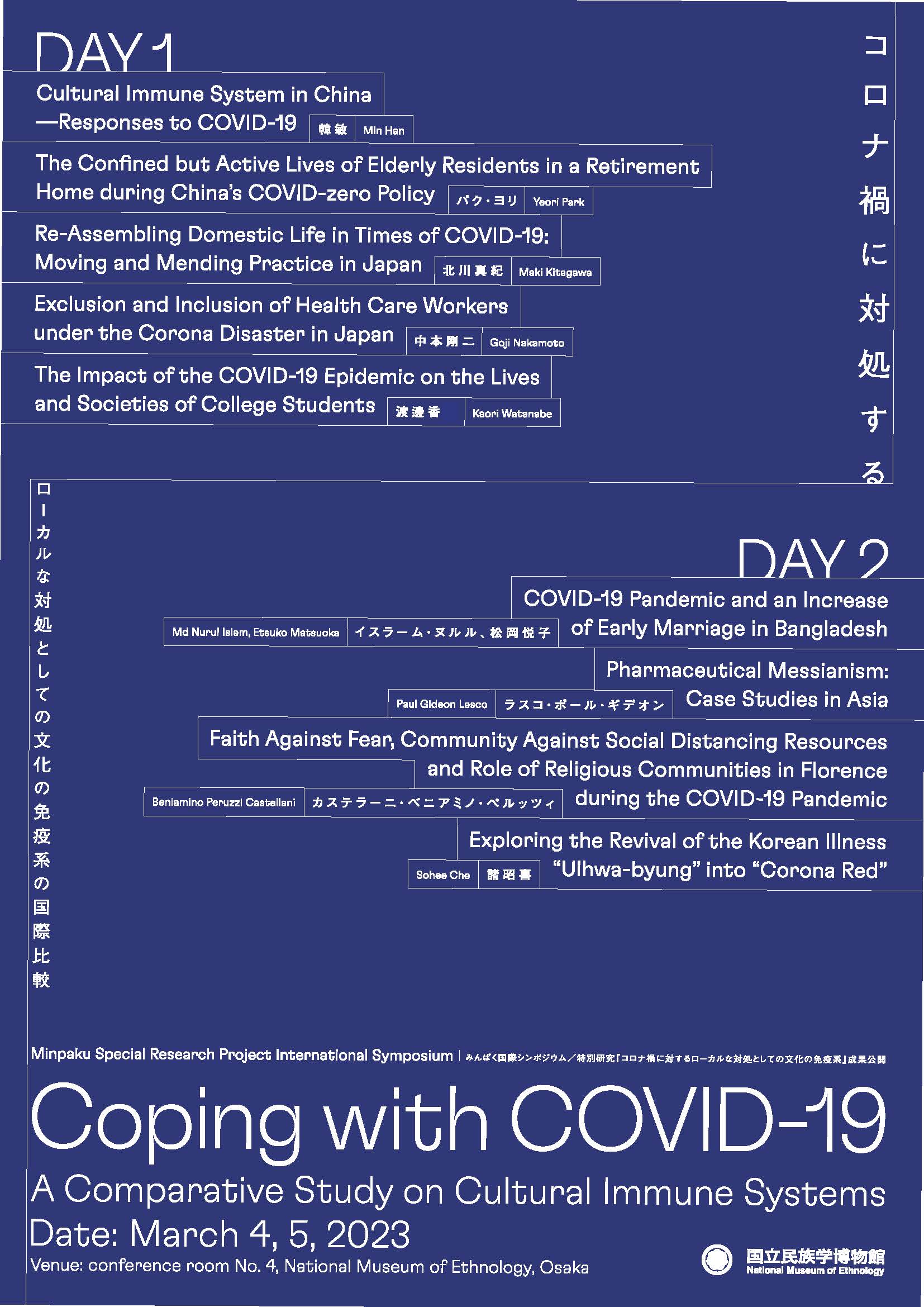Coping with COVID-19: A Comparative Study on Cultural Immune Systems

A Comparative Studies on the Cultural Immune Systems against Covid-19
| Date | Saturday, March 4 – Sunday, March 5, 2023 |
|---|---|
| Venue | Online+Conference Room No. 4, National Museum of Ethnology, Osaka |
| Language | (at NME) Japanese / English(*Simultaneous interpretation in English is available). (Online) English |
| Inquiry | Inquiry and application for Zoom Invitation E-mail: ess★minpaku.ac.jp (Please replace ★ with @) |
| Convener | Ippei Shimamura (National Museum of Ethnology, Japan) |
The near-simultaneous spread of COVID-19 across the globe has highlighted a latent sense of discrimination in society. In this context, as Kenji Yoshida argued, the significance and raison d’être of all the systems and norms that humanity has created since the beginning of modern times is once again being questioned. However, Hiromi Shimada, a renowned Japanese religious scholar, argues that the pandemic has gravely impacted religion because it relies on the gathering of believers, which the pandemic has severely restricted. In the realm of micro and local cultural practices, where anthropology has a keen interest, people do not necessarily gather. Instead, various coping mechanisms, referred to as the “cultural immune system,” have been employed to mitigate the impact of COVID-19.
This symposium aims to compare and analyze the ways in which the “cultural immune system” has been activated in response to COVID-19 in various Asian countries such as Japan, China, South Korea, Mongolia, the Philippines, and Bangladesh, and also consider other regions like Europe. The approach to handling the pandemic varies in different regions and countries, including the implementation of biomedicine. Hence, we refer to the “cultural immune system” as the “method of coping with the COVID-19 crisis” and aim to gather examples of “local measures” from different countries, regions, and sites.
PROGRAM
DAY 14th March (Saturday)
| 13:30 – 13:40 | Opening Remark Kenji Yoshida (Director-General of National Museum of Ethnology) |
|---|---|
| 13:40 – 13:50 | Introduction Ippei Shimamura (National Museum of Ethnology) |
Presentations
| 14:00 – 14:40 |
Cultural Immune System in China–Responses to COVID-19 Min HAN(National Museum of Ethnology) |
|---|---|
| 14:40 – 15:20 |
The Confined but Active Lives of Elderly Residents in a Retirement Home during China’s COVID-zero Policy Yeori Park (University of Michigan) |
| 15:20 – 16:00 |
Re-Assembling Domestic Life in Times of COVID-19: Moving and Mending Practice in Japan Maki Kitagawa (University of Tokyo) |
| 16:00 – 16:20 | TEA BREAK |
| 16:20 – 17:00 |
Exclusion and Inclusion of Health Care Workers under the Corona Disaster in Japan Goji Nakamoto (Osaka University) |
| 17:00 – 17:40 |
The Impact of the COVID-19 Epidemic on the Lives and Societies of College Students Kaori Watanabe (National Center for Global Health and Medicine/ National College of Nursing Japan) |
DAY 2 5th March (Sunday)
| 10:30 – 11:10 |
COVID-19 Pandemic and an Increase of Early Marriage in Bangladesh Md Nurul Islam (UNFPA)and Etsuko Matsuoka (Nara Women’s University) |
|---|---|
| 11:10 – 11:50 |
Pharmaceutical Messianism: Case Studies in Asia Paul Gideon Lasco (University of the Philippines Diliman) |
| 11:50 – 12:50 | LUNCH TIME |
| 12:50 – 13:30 |
Faith Against Fear, Community Against Social Distancing Resources and Role of Religious Communities in Florence during the COVID-19 Pandemic Beniamino Peruzzi Castellani (Scuola Normale Superiore , Faculty of Political and Social Science) |
| 13:30 – 14:10 |
Exploring the Revival of the Korean Illness “Ulhwa-byung” into “Corona Red” Sohee Che (National Museum of Ethnology) |
| 14:30 – 15:15 | DISCUSSION |
| 15:15 – 15:30 |
Closing Remark Min HAN(National Museum of Ethnology) |
